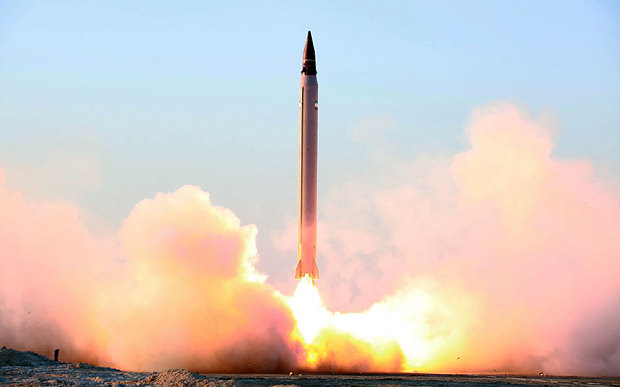
The Islamic Republic denied it had done anything to violate UN Security Council Resolution (UNSCR) 2231—but the Americans had accused it of violating UNSCR 1929, not 2231, so the denial was off-base, as the Islamic Republic well understood.
UNSCR 1929 was passed in 2010 and forbids Iran to test any missiles that could carry a nuclear warhead. The tested missile is of the size that fits the international definition of a missile capable to carrying a nuclear warhead.
UNSCR 1929 will be replaced in a few months by a new resolution, 2231, with a far weaker wording—wording that only urges Iran not to test any missiles designed to carry nuclear warheads. That new resolution will come into effect on the day that the new nuclear accord comes into effect, the day when sanctions are removed.
The question many were asking is why Iran went ahead and tested its new Emad missile last week when it could just have waited a few months and not have to face charges of violating the UN resolution.
The missile test appeared to be part of an effort to convince hardliners and ordinary Iranians that Iran’s missile program will not be impinged in any way by the new nuclear agreement. But the effect was to enrage many hardliners in the United States who said the test was proof that Iran does not adhere to its international agreements and won’t adhere to the new nuclear agreement either.
Iran tested the new Emad missile October 11. Five days later the US ambassador to the UN, Samantha Power, told the UN Security Council the test was “a clear violation” of UNSCR 1929. She said the US was preparing a report to the Security Council committee that monitors UN sanctions on Iran. She did not say what action Washington would seek.
This test, however, was not the first Iranian test of a long-range missile since the resolution was passed June 9, 2010. No one seemed to notice or care about the other tests.
And President Obama didn’t seem terribly excited about this one either. When asked about it at a press conference Friday, he said, “Iran has often violated some of the prohibitions surrounding missile testing.”
Administration officials seemed chiefly concerned to make clear that the missile testing prohibition is not part of the nuclear agreement and doesn’t mean Iran is violating that agreement, as Republican hardliners were quick to charge.
White House spokesman Josh Earnest said, “We have seen Iran almost serially violate the international community’s concerns about their ballistic missile program,” but that, he said, is “entirely separate” from the nuclear agreement.
“We’ve seen that Iran over the last couple of years has demonstrated a track record of abiding by the commitments that they made in the context of the nuclear talks,” he said, referring to the interim nuclear agreement reached in January 2014 that the International Atomic Energy Agency (IAEA) has certified quarterly was being adhered to by Iran.
UNSCR 1929 says the UN Security Council “decides that Iran shall not undertake any activity related to ballistic missiles capable of delivering nuclear weapons, including launches using ballistic missile technology.”
The word “decides” means the Security Council is issuing a binding order.
The new UNSCR 2231, to take effect in a few months, “calls upon” Iran “not to undertake any activity related to ballistic missiles designed to be capable of delivering nuclear weapons”—very different terminology. The term “calls upon” is hortatory and does not impose a requirement. And Iran simply denies the missile is “designed” to carry a nuclear warhead, easily brushing aside the point that it is “capable” of carrying a nuclear warhead by its size under the legal international definition.
In Tehran, Deputy Foreign Minister Abbas Araqchi told state broadcasting Friday that “missile tests are by no means a violation of the Joint Comprehensive Plan of Action,” the formal title of the nuclear agreement. But the United States did not accuse Iran of violating the JCPOA—quite the opposite.
Then Araqchi said of Iran’s missiles, “Their production and testing are not contrary to Resolution 2231.” Again, Washington did not accuse Iran of violating 2231, which is not even in effect yet. Araqchi carefully avoided saying whether the test violated Resolution 1929.
Majlis Speaker Ali Larijani did not engage in any legal argument. He said Americans “can say anything they want. We do not care because we must be powerful. If we do not have strong defense capabilities, we cannot resist our enemies.”
France joined the United States in saying the missile test “constitutes a clear violation” of 1929. Britain’s ambassador to the UN, Matthew Rycroft, said the missile test should be looked into by the UN, but he did not characterize the test as a violation. The Iran Times has not noted any comments from other members of the Big Six.
